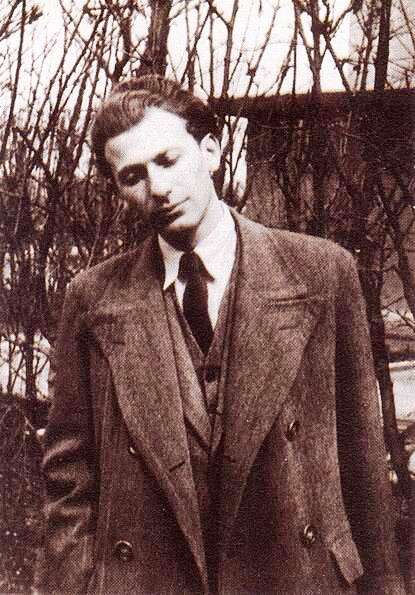Radnóti Miklós: War Diary (Háborús napló in English)
Háborús napló (Hungarian)1. Hétfő este
Immár a félelem sokszor sziven érint és néha messzi hír csak néked a világ; egyre régibb emlékként őrzik gyermeki korod a régi fák.
Gyanakvó reggelek s vészes esték között, háborúk közt élted le életed felét s most is ellened hajló szuronyok csúcsán villog a rend feléd.
Még álmaidban néha fölötlik a táj, verseid hona, hol szabadság illan át a réteken és reggel, ha ébredsz, hozod magaddal illatát.
Ritkán, ha dolgozol, félig és félve ülsz asztalodnál. S mintha élnél lágy iszapban, tollal ékes kezed súlyosan mozdul és mindig komorabban.
A világ új háborúba fordul, éhes felhő falja föl egén az enyhe kéket, s ahogy borul, úgy féltve átkarol s zokog fiatal feleséged.
2. Kedd este
Nyugodtan alszom immár és munkám után lassan megyek: gáz, gép, bomba készül ellenem, félni nem tudok és sírni sem, hát keményen élek, mint a hideg hegyek között útépítők,
akik, ha könnyű házuk fölöttük összedől elaggva, újat raknak és közben szagos forgácson alusznak mélyeket s reggelente fényes és hideg patakba mártják be arcukat.
*
Magosban élek s kémlelek: körül borul. Mint hajónak ormán viharban, villám fényinél kiált az őr, ha partot látni vél, úgy vélek én is, mégis partokat és l é l e k ! kiáltok fehér hangon én is.
És hangomra fölragyog és hangom messzehordja hűvös csillag és hűvös esti szél.
3. Fáradt délután
Az ablakon haldokló darázs repül be, alvó asszonyom álmában beszél, a barnuló felhők széleire fehér fodrokat fú a gyönge szél.
Miről beszélhetek? tél jön, s háború jön; törten heverek majd, senkise lát; férges föld fekszik szájamban és szememben s testem gyökerek verik át.
*
Ó, ringó délután, adj nyugalmat, lefekszem én is, később dolgozom. Napod fénye már a bokrokon lóg. s amott az este jő a dombokon.
Felhőt öltek, vére hull az égen, lenn, parázsló levelek tövében ülnek a borszagú, sárga bogyók.
4. Esteledik
A síkos égen ereszkedik a nap, korán jön végig az úton az este. Jöttét az éles hold hiába leste: ködöcskék hullanak.
Ébred a sövény, fáradt vándorba kap, az este a fák ága között forog és egyre dong, míg épülnek e sorok s egymásra hajlanak.
Csöndes szobámba rémült mókus pattan és itt két hatodfeles jambust szalad. Faltól ablakig, egy barna pillanat s eltűnik nyomtalan.
A röpke béke véle tünt; hallgatag férgek másznak szét a messzi réteken és lassan szerterágják a végtelen sort fekvő holtakat.
1935-1936
|
War Diary (English)1. Monday Evening
You see, now fear often fingers your heart, and at times the world seems only distant news; the old trees guard your childhood for you as an ever more ancient memory.
Between suspicious mornings and foreboding nights you have lived half your life among wars, and now once more, order is glinting toward you on the raised points of bayonets.
In dreams sometimes the landscape still rises before you, the home of your poetry, where the scent of freedom wafts over the meadows, and in the morning when you wake, you carry the scent with you.
Rarely, when you are working, you half-sit, frightened at your desk. And it's as if you were living in soft mud; your hand, adorned with a pen, moves heavily and ever more gravely.
The world is turning into another war—a hungry cloud gobbles the sky's mild blue, and as it darkens, your young wife puts her arms around you, and weeps.
2. Tuesday Evening
Now I sleep peacefully and slowly go about my work— gas, airplanes, bombs are poised against me, I can neither be afraid, nor cry; so I live hard, like the road builders among the cold mountains,
who, if their flimsy house crumbles over them with age, put up a new one, and meanwhile sleep deeply on fragrant wood shavings, and in the morning, splash their faces in the cold and shining streams.
*
I live high up, and peer around: it is getting darker. As when from a ship's prow at the flash of lightning the watchman cries out, thinking he sees land, so I believe in the land also—and still I cry out life! with a whitened voice.
And the sound of my voice brightens and is carried far away with a cool star and a cool evening wind.
3. Weary Afternoon
A dying wasp flies in at the window, my dreaming wife talks in her sleep, and the hems of the browning clouds are blown to fringes by a gentle breeze.
What can I talk about? Winter is coming, and war is coming; soon I will lie broken, seen by no one; worm-ridden earth will fill my mouth and eyes and roots will pierce through my body.
*
Oh, gently rocking afternoon, give me peace— I will lie down too, and work later. The light of your sun is already hanging on the hedges, and yonder the evening comes across the hills.
They have killed a cloud, its blood is falling on the sky; below, on the stems of the glowing leaves sit wine-scented yellow berries.
4. Evening Approaches
Across the slick sky the sun is climbing down, and the evening is coming early along the road. Its coming is watched in vain by the sharp-eyed moon— little puffs of mist are gathering.
The hedgerow is wakening, it catches at a weary wanderer; the evening is spinning among the tree branches and humming louder and louder, while these lines build up and lean on one another.
A frightened squirrel springs into my quiet room, and here a six-footed iambic couplet scampers by. From the wall to the window, a brown moment— and it's gone without a trace.
The fleeting peace disappears with it. Silent worms crawl over the far fields and slowly chew to pieces the endless rows of the reclining dead.
|
||||||||||




